A&S Sweeps Meredith Awards
Chemist Robert Doyle is new Meredith Professor of Teaching Excellence
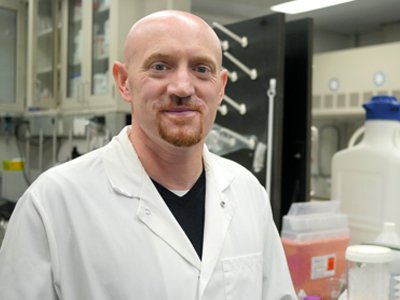
Robert Doyle, professor of chemistry in the College of Arts and Sciences, has been appointed the 2016-19 Laura J. and L. Douglas Meredith Professor of Teaching Excellence. Doyle shares the honor with Peter Wilcoxen, professor of public administration and international affairs in the Maxwell School of Citizenship and Public Affairs. Both were recognized last week on campus.
In addition, seven non-tenured faculty members are being given Meredith Teaching Recognition Awards, five of whom have ties to A&S: Elizabeth Ashby, Patrick Berry, Dawn Dow, Natalie Koch, and Kevin Morrison.
A substantial bequest from the estate of L. Douglas Meredith, a 1926 graduate of the College of Arts and Sciences, allowed for the creation of the Laura J. and L. Douglas Meredith Professorships in 1995 to recognize and reward outstanding teaching at the University. The awards recognize and reward excellence in teaching, encourage faculty members to look upon the many dimensions of teaching as manifold opportunities for constant improvement, emphasize the great importance the University places upon teaching, and improve the teaching and learning processes on campus. The Meredith Professors receive a supplemental salary award and additional funding for professional development for each year of their appointment.
Robert Doyle
Professor of Chemistry
Doyle loves to teach. “From my time as a graduate teaching assistant to today, as a full professor, it remains one of the highlights of my week to enter a lab or classroom,” he says.
Doyle makes chemistry come alive for his students by making it relatable and accessible. “Chemistry is all around us, in everything we see and do, in everything we wear, eat and utilize,” he says. “An appealing way to attract and excite students is to demonstrate how news headlines, for example regarding new antibiotics, the search for life on Mars or synthetic diamonds, are all examples of chemists at work.”
Doyle says the way he has taught the freshman-level CHE 103, a course for non-science majors, is a good reflection of his teaching philosophy. He approaches his teaching from the perspective of “What about chemistry impacts the life of a typical Syracuse University undergraduate?” This, he says, opens up questions that students are interested in. He also replaced the course’s final exam with a writing project, which resulted in students exploring the chemistry of objects and processes within their own disciplines.
Outside of the classroom, Doyle has worked to bring undergraduate students into his laboratory. “Innovation in teaching chemistry is teaching it through research, in a lab,” he says. He established a core group of high-achieving undergraduates to start in the lab early in their undergraduate careers, devote at least 10 hours a week and be open to applying for nationally competitive scholarships. Over the past decade, the group has developed a strong mentoring model and produced scholars who have excelled—they have been involved in peer-reviewed research and received national and University awards. Doyle has also worked closely with the University’s CSTEP and McNair Programs and the Renée Crown University Honors Program.
“I first met Professor Doyle while taking his honors chemistry laboratory course my freshman year. I remember being amazed that he was giving us the opportunity to explore the scientific process from beginning to end, as opposed to performing designated experiments,” says Allison Roberts, a former student of Doyle. “I felt that he was holding us to such a high standard so that we could realize that the bar we had set for ourselves was actually way lower than what we were capable of. By the end of that course, I not only had a new appreciation for the scientific method and research as a whole, but also had developed a new desire to push myself beyond what I thought was possible.”
“We see in Rob Doyle a gifted and innovative educator whose broad scientific foundations, unique perspective on pedagogy and engaging personal style make him a valuable resource to the department and the college,” says fellow chemistry professor Tim Korter. “His incredible breadth of scientific knowledge allows him to teach a significant number of our department's offerings in inorganic and biological chemistry and positions him to play a leadership role in developing cross-disciplinary courses and programs.”
Doyle has taught in the College of Arts and Sciences since 2005. And while he maintains a very active laboratory and research portfolio, teaching remains his priority. “I believe that while I have been successful in research terms, my greatest impact will ultimately be made through teaching. I see students who have conducted research under my mentorship and students who have taken my classes change direction or find new, highly fulfilling direction, and that has given me more delight than any grant or paper to date,” he says.
For his Meredith project, Doyle proposes a full-day Laura J. and L. Douglas Meredith Symposium in the Chemical and Biological Sciences over the course of three years. The symposium will feature eight, 25-minute presentations by undergraduate students who have conducted at least one full semester of research and who participate in, or are eligible for, the McNair Program or the Women in Science and Engineering (WISE) Program at the University. The goal of the symposium is to encourage and foster the development of first-generation students and women in science and engineering, and to prepare them for national conference participation.
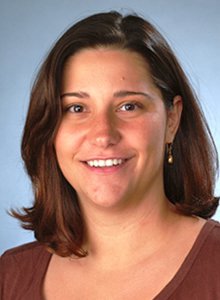
Meredith Teaching Recognition Awards
The Teaching Recognition Awards program was established in 2001 through an expansion of the Laura J. and L. Douglas Meredith Professorship Program. The Meredith Professors themselves proposed that the Teaching Recognition Award Program recognize excellence in teaching by non-tenured faculty and adjunct and part-time instructors. Recipients are selected for teaching innovation, effectiveness in communicating with students and the lasting value of their courses. To be eligible, candidates must have completed two years of service to the University and not yet received tenure. Each recipient is given $3,000 to further his or her professional development.
Elizabeth Ashby
Assistant Professor of Economics, Maxwell School of Citizenship and Public Affairs and College of Arts and Sciences
Ashby taught her first economics course in the summer of 2002, after completing her second year in the University’s economics Ph.D. program. That experience confirmed for her that she wanted a career in teaching. She joined the Department of Economics in 2005 towards the completion of her degree.
She has offered a number of different courses, but has taught ECN 203, "Economics Ideas and Issues," consistently for the past several years. This course is the gateway to the economics major and a requirement for many programs and majors across campus. “Some feel apprehensive, arriving with the misconception that economics is too difficult for them to learn. This is my challenge,” Ashby says. “I enjoy this diverse community of learners and helping them to appreciate the relevance of economics.” She aims to help students connect the classroom to the greater world and to cultivate student interest in economics.
From 2011 to 2015, she served as the director of undergraduate studies (DUS) in economics and currently serves as director of advising. One of her significant contributions to the department has been in co-founding the “Networking Night for Economics Majors.” Held each semester, this event offers economics majors the opportunity to meet with potential employers and learn about internship and career opportunities. “Creating this opportunity for students was not a part of the DUS job description. But Beth didn't define her DUS responsibilities by the job description. She defined them by what is best for our students,” says Jerry Evensky, professor of economics and Meredith Professor for Teaching Excellence. “That's dedication. That's going above and beyond. That's Beth.”
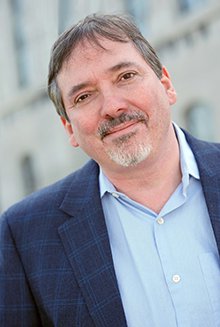
Patrick W. Berry
Assistant Professor of The Writing Program
During his five years at Syracuse, Berry has taught a total of 12 different courses. His doctoral seminars have included core courses in composition history and theory and composition pedagogy, along with a special topics course that brings together his expertise in literacy studies and digital humanities.
Berry says his teaching and curricular innovations have involved rethinking the relationship between course content and real-world experiences, studying the place of contemplative practices in teaching and learning, and in finding opportunities to extend learning beyond the classroom. During the 2013-14 academic year, he designed courses in listening in rhetoric and composition, which received support from the University’s Humanities Center. “One way to improve engagement is to attend to listening, which I believe is something we need to teach. Even if everything is an argument, as some writing researchers contend, students need to learn to deepen engagement, question assumptions and develop writing that is ethically and culturally responsible,” Berry says.
When a group of writing majors decided they wanted to establish a student organization in the spring 2014 semester, Berry offered support to make the Writing Program Student Organization a reality. He has also connected students with the highly respected HASTAC program (Humanities, Arts, Sciences, Technology Alliance and Collaboratory), a national organization that supports collaborative ventures among graduate students doing innovative work in the digital humanities. Five SU composition and cultural rhetoric Ph.D. students have been named HASTAC Scholars over the past four years. In 2014, the composition and cultural rhetoric Ph.D. program's Graduate Circle honored Berry with their annual outstanding faculty mentor award.
“In addition to excelling in every aspect of his classroom teaching and mentoring, Patrick has left a profound mark on the Writing Program through his efforts to make additional opportunities available to students,” says Lois Agnew, director of the Writing Program.
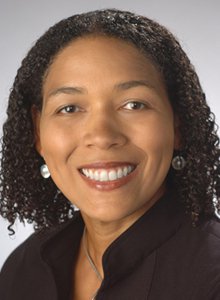
Dawn Dow
Assistant Professor of Sociology, Maxwell School of Citizenship and Public Affairs and College of Arts and Sciences
Dow is in her fourth year in the sociology department. Even though her classes cover sensitive topics, including race and ethnic inequalities, her students say she has created an environment in which they can discuss, debate and learn.
Dow approaches her teaching with four main goals in mind: to help her students become engaged learners; to empower students to tackle controversial issues through respectful debate and discussion; to support diversity; and to mentor and advise. Her classroom discussions are rooted in contemporary events, related to the course materials, to promote engaged learning. Her classes have included discussions of Trayvon Martin and the trial of George Zimmerman; the Supreme Court case Fisher v. University of Texas, proposed changes to census categories; celebrity appropriation of gender and racial images; the DREAM Act; Michael Brown’s shooting in Ferguson, Mo.; and voting rights.
“Dawn Dow is one of the most extraordinary teachers we have had in the sociology department,” says Madonna Harrington Meyer, chair of the sociology department and Meredith Professor for Teaching Excellence. “She has a very organized and embracing style of teaching that allows students to relax both in the knowledge that they know what is expected and that they can, and will, discuss sensitive topics in a safe classroom environment.”
Dow says she encourages students to become self directed, independent and critical consumers of knowledge, and lifelong learners. “My aim as a professor is to ensure that my students become critical thinkers who are willing to explore creative solutions to social problems,” she says.
She has served as a mentor in the McNair Scholars Program and is a member of the National Center for Faculty Diversity and Development, a professional development organization that is dedicated to the advancement of underrepresented groups within the academy.
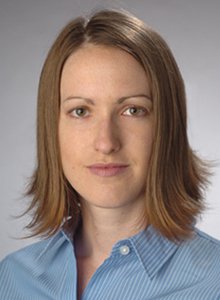
Natalie Koch
Assistant Professor of Geography, Maxwell School of Citizenship and Public Affairs and College of Arts and Sciences
As a faculty member in the geography department for the past four years, Koch has taught everything from 100-level courses to advanced doctoral seminars. She has developed new courses on urban geography, political geography, sports and the Middle East, and revived old courses such as regional geography.
Realizing that geography graduate students did not have strong backgrounds in political geography, she restructured her graduate courses to provide that necessary introduction. A lifelong athlete, she sees her relationship with her students in comparison to a coach and a team. “The coach is there to provide guidance and facilitate a safe and healthy environment, but ultimately the team members are the ones who must play the game,” Koch says. “And like a successful team, I believe that learning is most productive when it is collaborative and when diverse ways of thinking and approaching a problem are welcomed by all.”
Koch is innovative in her teaching, always looking for new approaches to connecting students with the course material and with each other. Some of her methods include free-writing activities, student-submitted discussion questions, student-led debates and discussions and timed writing exercises, among others. “I believe critical and independent thinking to be the single most important skill students can acquire in the course of their university education,” she says. “As such, my primary objective as a teacher is not to teach students what to think about certain materials, but how to think about and critically analyze different materials, as well as being open to learning and challenging their own ideas.” Through her courses, she aims to help her students understand the meaning of global citizenship as they chart careers in an increasingly global marketplace.
“Natalie meets students where they are and works closely with them to get where they want to be, “ says Jamie Winders, chair of the geography department, associate professor of geography and O’Hanley Faculty Scholar. “She thoughtfully assesses her classroom, seeking ways to reach all students.” Additionally, Koch is the author of 21 articles and eight book chapters, and co-edited one book.
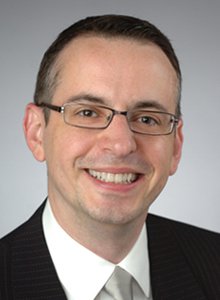
Kevin Morrison
Assistant Professor of English, College of Arts and Sciences
A faculty member in the Department of English since 2009, Morrison has consistently designed new courses at both the undergraduate and graduate levels for students in English, history, women’s and gender studies, visual and performing arts, and architecture. He is a scholar of Victorian British literature and culture.
In teaching, he may juxtapose the sermons of the 18th-century Methodist preacher John Wesley with "Oliver Twist," Charles Dickens' 19th-century novel, in order for students to see how understandings of the child as being essentially venal or innocent evolved. Or he may teach Mrs. Beeton’s "Book of Household Management," written in the mid-19th century, alongside the contemporaneously published poem "The Angel in the House" by Coventry Patmore to convey how idealizations of wives and mothers, which still persist, were originally constituted.
“Kevin's zeal for pedagogical innovation is matched only by his commitment to intellectual integrity,” says Erin Mackie, chair of the English department. “He has a sharp appetite for teaching and has developed a menu of methods and techniques, as well as of content, that is exceptional for any professor, all the more so in one on the first lap of his career.”
Morrison regularly teaches a course on "Literary Urban Studies" as the critical methods course (ETS 305) required for English majors. He teaches at SU London every summer, and has launched three new courses there. For summer 2017, he has proposed a fourth on 19th-century serial killing in London and Paris. This course is cross-listed as: ETS 310, ENG 600, HST 400/600 and WGS 360 and serves undergraduate and graduate students across three disciplines.
“I am an interdisciplinary scholar and teacher; however, I never lose sight of the fact that my principal responsibility is training students in formal literary analysis,” says Morrison. “For both upper- and lower-division courses, I take particular care in designing writing assignments that help students work through conceptually and often rhetorically difficult texts and also improve their analytic and critical-thinking skills.”
Featured
Robert Doyle Jack and Laura H. Milton Professor and Dean's Professor of Chemistry
Patrick Berry Associate Professor, Writing and Rhetoric
